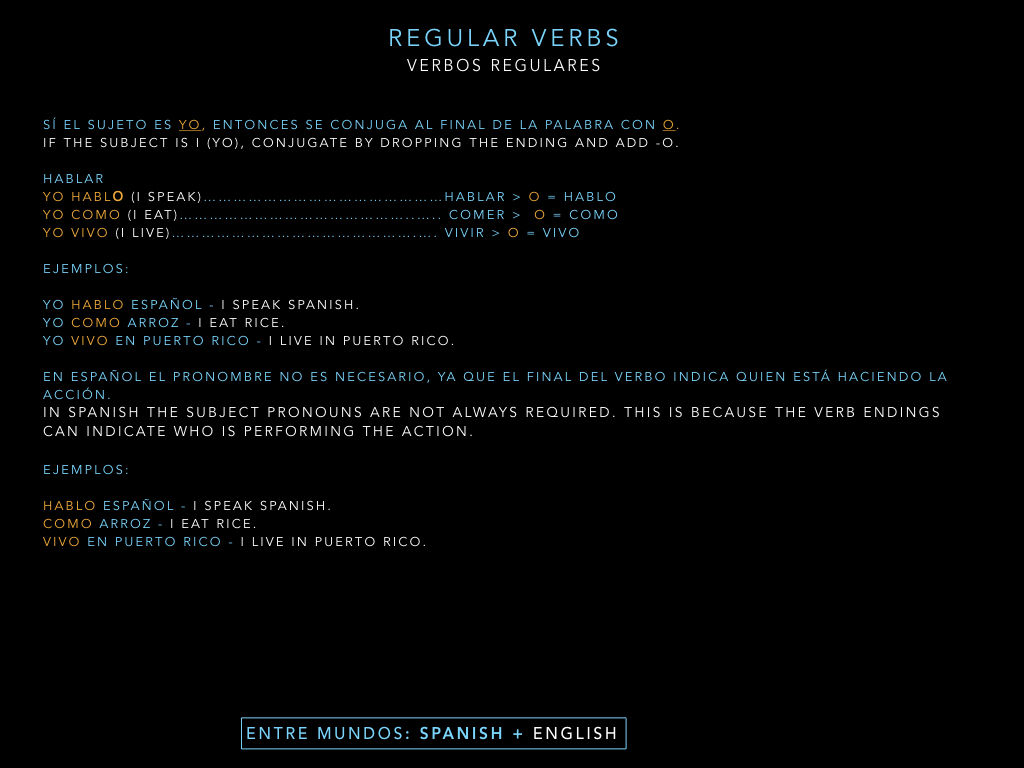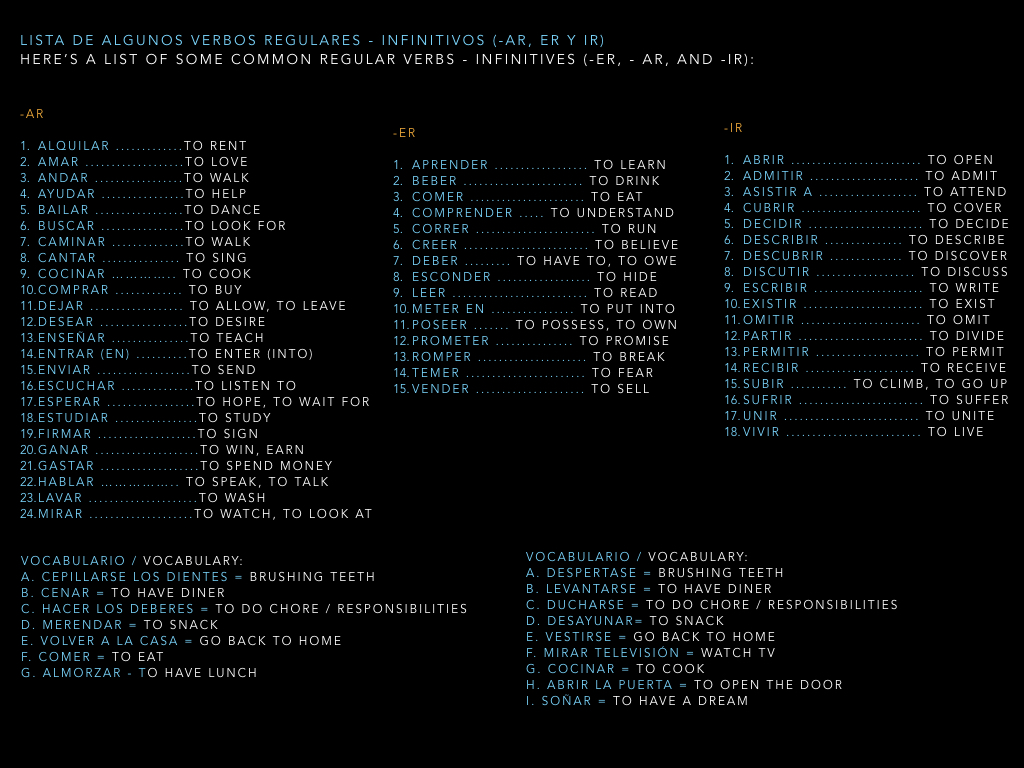Verbos Regulares
Los infinitivos son las base de verbo. En español, los infinitivos termina en -ar, -er, or -ir.
Infinitives are the base form of the verb. In Spanish, all infinitives end in -ar, -er, or -ir.
Ejemplo de verbos regulares:
Example of regular verbs:
Nota que las últimas dos letras de cada verbo.
Notice the last two letters of each verb.
AR- hablar ...................... (to speak)
ER - comer ...................... (to eat)
IR - vivir .......................... (to live)
Sí el sujeto es YO, entonces se conjuga al final de la palabra con O.
If the subject is I (yo), conjugate by dropping the ending and add -o.
HABLAR
Yo hablo (I speak)…………………………………………hablar > o = hablo
Yo como (I eat)………………………………………..….. comer > o = como
Yo vivo (I live)………………………………………….…. vivir > o = vivo
Ejemplos:
Yo hablo español - I speak Spanish.
Yo como arroz - I eat rice.
Yo vivo en Puerto Rico - I live in Puerto Rico.
En español el pronombre no es necesario, ya que el final del verbo indica quien está haciendo la acción. / In Spanish the subject pronouns are not always required. This is because the verb endings can indicate who is performing the action.
Ejemplos:
Hablo español - I speak Spanish.
Como arroz - I eat rice.
Vivo en Puerto Rico - I live in Puerto Rico.
“YOU” inFormal
Si el sujeto es Tú, entonces se conjuga al final de la palabra con AS o ES. Si el verbo regular termina con AR entonces su conjugación termina con AS. Si el verbo regular termina con ER o IR entonces su conjugación termina con ES. / If the subject is you informal drop the ending and add either -as or -es. If the verb is an -ar verb, add -as. If it is an -er or -ir verb, add -es.
Tú hablas (You speak)………………………………..… hablar > as = hablas
Tú comes (You eat) ………………………………..…… comer > es = comes
Tú vives (You live) …………………………………..….. vivir > es = vives
“YOU”Formal
Si el sujeto es usted, entonces se conjuga al final de la palabra con A o E. Si el verbo regular termina con AR entonces su conjugación termina con As. Si el verbo regular termina con ER o IR entonces su conjugación termina con ES. / If the subject is you formal drop the ending and add either -a or -e. If the verb is an -ar verb, add -a. If it is an -er or -ir verb, add -e.
Usted habla (You speak)………………………………..… hablar > a = habla
Usted come (You eat) ………………………………..…… comer > e = come
Usted vive (You live) ………………………………..….. vivir > e = vive
Si el sujeto es él o ella, entonces se conjuga al final de la palabra con A. Si el verbo regular termina con AR entonces su conjugación termina con A. Si el verbo regular termina con ER or IR entonces su conjugación termina con e. / If the subject is he or she, conjugate by dropping the ending and add -a. If the verb is an -ar verb, add -a. If it is an -er or -ir verb, add -e.
él o ella habla (he or she speaks)……… hablar > a = habla
él o ella come (he or she eats)…….… comer > e = come
él o ella vive (he or she lives)…………vivir > e = vive
Si el sujeto es NOSOTROS(AS), entonces se conjuga al final de la palabra para terminar con AMOS, EMOS o IMOS. Si el verbo regular termina con AR entonces su conjugación termina con AMOS. Si el verbo regular termina con ER entonces su conjugación termina con Emos. Si el verbo regular termina con IR entonces su conjugación termina con IMOS. / If the subject is we, conjugate by dropping the ending and add -amos, -emos, or -imos. Notice that the ending of the infinitive determines which is used: -ar verbs add -amos, -er verbs add -emos, -ir verbs add -imos.
Nosotros/as hablamos (We speak)...…hablar > amos
Nosotros/as comemos (We eat)….......comer > emos
Nosotros/as vivimos (We live)….….....vivir > imos







